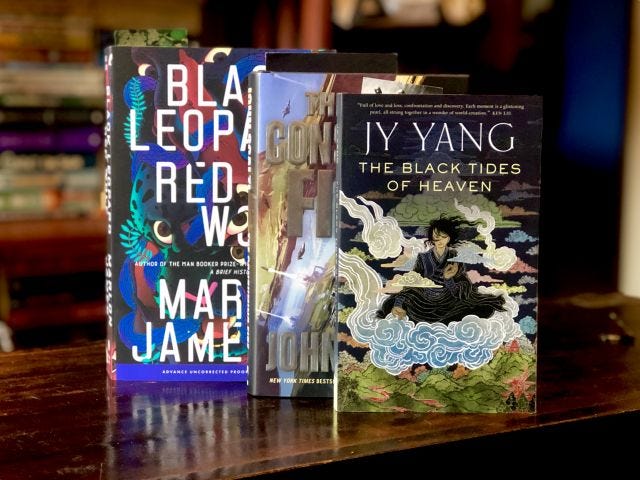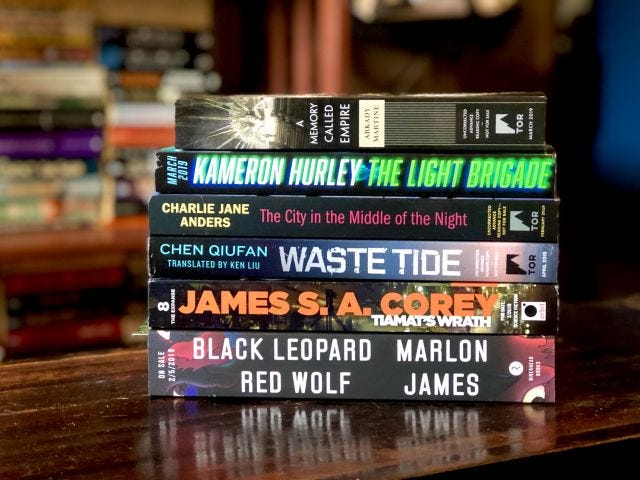History, generation ships, and suspension pods

Happy new year!
I hope that you had an opportunity to take a break over the holidays. I took two weeks off, which was great — I feel like I haven't taken a break in a while, and it was nice to get out and see family, do a bit of traveling, and also get in a couple of days in which I didn’t have to do … anything.
I didn't actually spend my time doing nothing — I read, handled the child, and spent some of the time cleaning — I reorganized my office and cleaned out the closet. I don’t know why I held onto random printouts of military history papers from my master’s degree, but there were boxes and folders of them. Into the recycling they went, along with reams of old pay stubs and bills that ended up in there. I also purged a shelf of mass-market paperbacks, stuff I've held onto for no real reason, and moved a small bench (really, a small coffee table) into the middle of the room for random stacks of stuff that accumulates in here. The whole place feels a bit lighter and less cluttered, which is nice, and it's a good way to start the new year.
Histories and suspension chambers
A while ago on Twitter, I asked for suggestions for standalone SF novels — nominally for this list — but also because I was generally interested in finding something different to pick up. One story that came up a lot was Adrian Tchaikovsky’s Children of Time. Orbit recently released the book in the US for the first time — it originally came out in the UK in 2015 and won the Arthur C. Clarke Award. I picked up both the book and the audiobook, which we listened to on the drive down to PA and back between Christmas and New Year's Eve.
It’s a fantastic novel, and I can see where all the praise is coming from I’ll write up a proper review of it at some point in the coming week, but something stood out for me that’s notable: Tchaikovsky’s use of suspended animation for his characters to play out a story that stretches thousands of years.
He’s not the first to do this by a long shot, but the use here reminded me of Cixin Liu’s The Dark Forest, and Peter Watts’ Freeze-Frame Revolution, in which several characters drop in and out of suspension, again, over decades and hundreds of years. Both stories use the technology not just as a convenient tool for the characters, but it’s also a neat literary instrument that allows both Cixin and Tchaikovsky to frame their story from one, unwavering perspective.
In Children of Time, that’s Holsten, a member of the crew of a generation ship, and a trained historian. Earth is effectively rendered uninhabitable, and the few survivors head out to the depths of space to find a new home, and end up at Kern’s World, a terraformed paradise that could reboot the human race. Unfortunately for them, the world is also home to an experiment to uplift monkeys to become sentient. That hit a setback: the monkeys burned up in the atmosphere in the first pages, and the nanovirus that was designed to uplift them went into spiders, instead. The book alternates chapters between the rise of the spider civilization, and the descent into barbarism and feudalism of the humans.
Generation ships have a long history within SF circles: spaceships that cross the vast gulfs of space, relying on successive generations of passengers to eventually arrive at their destination and establish colonies. It’s an entirely practical (and probably workable) way to spread out beyond Earth.
But, this can cause some narrative problems: you can limit yourself to one set of characters at one point in the voyage, or you can freeze them and wake them back up again. That’s what happens in Tchaikovsky’s book — Holsten is awoken to first interact and translate transmissions from a satellite orbiting Kern’s World, then at various points in later parts of their voyage. Each time he wakes up, he has to contend with new faces and new circumstances, as civilization essentially falls on the ship.
In Watts’ book, the characters face a similar situation: they’re frozen for millions of years at a time for short durations, and essentially have to figure out how to retake their lives in those brief snippets of times while they circle the Milky Way. In Cixin’s book, the Wallfacers (individuals tasked with coming up with ideas to defend the planet) go into suspension to jump ahead in time to help guide efforts. In both The Dark Forest and Children of Time, those jumps in time are useful mechanisms for their authors to use to examine how societies change over time, but while keeping a familiar perspective for the reader. Cixin uses it to show these huge, technological and sociological leaps that humanity takes over decades, while Tchaikovsky examines the weight of history on a small group of people who are effectively shepherding the survivors to safety. Hint: people don’t really work well under that kind of pressure.
In the broadest sense, playing with those scales of history are less about the mechanics of technology, terraforming, or generation ships, but of human culture: like the ships themselves, the stories are essentially all of human history wrapped up in a bottle, tossed out to sea, encapsulating all of our quirks and flaws to play out in a microcosm while drifting to a new home.
Further Reading
I haven't come across any meaty articles or anything (the holidays tends to have a lull with these types of things), but I did tally up the books and short stories that I read in 2018. I read... a lot, as it turns out. I also put together a 2018 favorites list for The Verge, which I'm pretty happy with.
Reading List

Coming into the new year, I had a bit of time to pick away at a couple of books since my last letter. I finished Ling Ma’s novel Severance, which was interesting. The book follows a young millennial office worker named Candice Chen who finds herself caught up in an epidemic that seems to wipe out everyone, save for a couple of survivors. Ma jumps back and forth — Candice’s life leading up to the outbreak of Shen Fever (which leaves the infected repeating the same repetitive tasks as they did before infection). She moves aimlessly through life, working at a publisher, and falls out of a relationship with an equally aimless guy, Jonathan. After the outbreak, she’s one of the last people in New York City, and eventually leaves with a group who head out to the midwest, to presumably rebuild civilization.
It’s a good example of the literary establishment pulling in speculative elements, and those speculative elements aren’t as interesting as the immigrant / coming-of-age story that they’re juxtaposed up against — people coming together under a potentially tyrannical leader just isn’t all that new or novel, but it’s an interesting read.
I also picked up a new reissue of Molly Gloss’s Outside the Gates, a YA-ish fantasy adventure in which a young boy named Vren is banished from his community, meets up with a wizard-like figure, and tries to make his way in the world. I really wish that I’d come across this as a kid — it reminded me a bit of Ursula K. Le Guin’s Earthsea stories.
I’m currently working through a bunch of books — John Scalzi’s The Consuming Fire, which is … kind of boring. It speeds along nicely, but it’s a lot of people talking at one another, which I don’t really find compelling. It's starting to pick up in the second part, so there's hope for it yet. More promising is Marlon James’ upcoming epic fantasy novel, Black Leopard, Red Wolf, which is bonkers good. I’m also checking out JY Yang’s The Black Tides of Heaven, which I meant to get to last year. I’ve got a couple of non-fiction books that I mentioned earlier that I want to get to.
Over the Christmas break, I ended up sinking into a Tolkien phase. I sat down to rewatch the Lord of the Rings trilogy — the extended editions, which I haven’t gotten through before. I’d tried way back when they first came out, but just didn’t have the patience for it. Going through now, I’m appreciating it more. Moreover, it’s prompting me to pull out the books again — I want to go back and give them a read with somewhat fresh eyes. I'm really loving the treatment for Fellowship of the Ring — it's just fleshing out the world a bit more, which Middle-earth certainly allows for.
While in high school, I was positively obsessed with Tolkien's trilogy. I read the entire thing before the films came out, but Jackson’s films compounded my interest in the books — I read them pretty much annually for a couple of years, but petered off after college. Jackson’s Hobbit trilogy was a disappointment, but I’ll probably get to those as well — after I finished reading the book to my son. It’s also prompted me to pick up Ian Nathan’s Anything You Can Imagine: Peter Jackson & The Making of Middle-earth, a book about the making of the film franchise. I'm also pondering submitting a paper to the upcoming Tolkien in Vermont conference that takes place every April at UVM — the theme this year is Tolkien & Horror.
Fiction!(?)
I posted up a short story in the last newsletter, and thanks to those of you who wrote in saying that they enjoyed it. Is that something you want to see more of? Writing more is a loose goal of mine for the year, and I think this is a good place to do that, but I’m toying with the idea of doing a special-ish edition of this letter that I’d reserve for that — I’m repurposing a title from a dead project, Transfer Orbit — which would be an irregular, separate edition — maybe with some stories from people who are not me. Interested? Yay/Nay?
The year ahead

I’ve since published my 2019 book list on The Verge, and man, there’s a lot of really good things coming up. There’s the aforementioned Black Leopard, Red Wolf, but also new books from Charlie Jane Anders, Kameron Hurley, James S.A. Corey, Ted Chiang, Adrian Tchaikovsky, as well as some other newcomers: Chen Quifan’s Waste Tide and Arkady Martine’s A Memory Called Empire, both of which I’m pumped to get to.
I’ve also got a left-over stack from last years that I’ll try and pick away at — Shaun Barger’s Mage Against the Machine, Richard K. Morgan’s Thin Air, Tade Thompson’s Rosewater, and Bina Shah’s Before She Sleeps are ones I really want to get through at some point. I’m also hoping to branch out beyond SF/F: there are some histories and scientific books I want to read through. And, as I mentioned, I want to go re-read LOTR.
There are other things coming up in 2019: some I can’t talk about yet, but there’s also a couple of bigger pieces that I’m hoping to write up in the near-ish future. Stay tuned.
As always, thanks for reading! Let me know what thoughts/comments/questions you have. If you liked this, forward it on to a friend or tell people about it!
Andrew